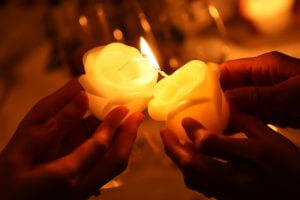Reflection by: Roxanne Farwick Owens, Associate Professor, Teacher Education, College of Education
“God allows [us] to give rise to the practice of two beautiful virtues: perseverance, which leads us to attain the goal, and constancy, which helps us to overcome difficulties.” [1] — Vincent de Paul
In this season of setting resolutions, let’s think about the virtues of perseverance and constancy. If those came naturally to us, we would not be among the 43% of Americans who give up their goals by mid-January, or the 91% who throw in the towel by early March. Examining Saint Vincent’s quote above more closely, we see a few important words beyond perseverance and constancy: “practice” and “overcoming difficulties.” There are going to be roadblocks and we’re going to have to practice how to get around them. Why are we surprised when we are presented with difficulties in meeting our goals?
We live in a society that values immediacy and quick results. We can’t order express delivery of accomplished resolutions from Amazon. Success takes time. We have to remind ourselves to celebrate each success along the way. We may not have hit our final target yet, but we’re on the way. And we have to grant ourselves grace if we take a step off the path once in a while.
Speaking of hitting targets, I love to bowl, even though I am terrible at it. (I’m not being modest. I am really bad, but I have a good time.) In bowling, the ultimate goal is to knock down the ten pins at the end of the 60-foot lane. There is a lot involved in a proper bowler’s stance, the steps you take, how you hold the ball, the way you swing your arms, and your follow-through. One of the biggest surprises to me? Successful bowlers don’t focus primarily on the 10 pins at the end of the 60-foot lane. They use the arrows and dots on the lane just past the foul line to help them aim their ball at the target. In other words, they focus on what is right in front of them. They know where the strike zone is—but they keep their eyes on what is closer to them to guide their path to success.
Another interesting thing about bowling is that the ball doesn’t have to actually hit all 10 pins to result in a strike. If the ball hits 4 specific key pins, there is a domino effect, and the rest will all fall. If the ball hits other random pins, it can result in dreaded combinations of splits. It will still be possible to achieve a strike, but it will be more difficult. So, as we fine-tune our resolutions, perhaps rather than considering all the many ways we could improve ourselves, we can narrow down to a few “key pins.” Working toward achieving a few key targets sounds so much more do-able than splitting our focus among multiple goals.
And perhaps on those really tough days when we want to abandon our resolutions, we can say to ourselves, “Saint Vincent said there would be days like this.” And then we can pick up the next ball and smash right through that obstacle.
I am going to consistently ask myself four key questions this year that might also be useful to you:
- How have I practiced taking risks toward growth this week?
- In what ways have I assessed and avoided conditions that might make me veer off-course, so I don’t get stuck behind a roadblock?
- Have I regularly granted myself grace and celebrated victories large and small to keep up motivation and maintain perseverance?
- Am I remembering to use the arrows right in front of me to guide the steps along my path, rather than focusing only on the end goal?
Reflection by: Roxanne Farwick Owens, Associate Professor, Teacher Education, College of Education
[1] The original quote is in reference to boredom, but making this slight change to the wording (see bracketed “us”) does not alter Vincent’s intentions nor the quote’s universal meaning. Letter 1228, “To Guillaume Cornaire, in Le Mans,” June 15, 1650, CCD, 4:36–7.




